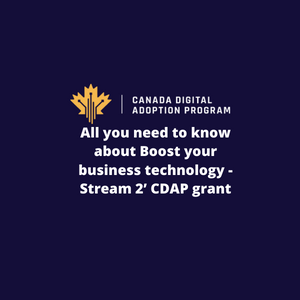As a small business owner in Canada, you know that running a successful business requires staying up-to-date with the latest trends. One of the most common of these trends that businesses are adopting worldwide is marketing automation and CRM technology fusion. Particularly, the CRM market in Canada was valued at $2.2 billion in 2020, and this figure is expected to grow significantly by 2028.
However, for many small business owners, technology and automation trends can be daunting and challenging to implement.
Fortunately, this guide can help you understand marketing automation and CRM better. Additionally, you’ll learn about one of the best marketing automation and CRM software, as well as some CRM and marketing automation best practices.
Understanding Marketing Automation and CRM
You may have heard the terms “marketing automation” and “CRM” thrown around, but what do they actually mean?
Simply put, marketing automation refers to the use of technology to automate repetitive marketing tasks and workflows such as email marketing, social media management, lead generation and scoring, customer segmentation, and more.
One of the ways marketing automation benefits your business is that it helps you streamline your marketing efforts and focus on creating personalized and targeted campaigns for your audience.
When you look up “CRM in marketing meaning” on the internet, you see many search results all saying the same thing—it is an effective tool that gives your marketing and sales team superpowers.
CRM stands for Customer Relationship Management. It refers to the strategies, practices, and technologies businesses use to manage and analyze customer interactions and data throughout the customer lifecycle, to improve customer relationships and drive business growth.
Adopting CRM in marketing will help you create targeted campaigns that speak to your customer’s specific needs and interests.
Marketing Automation vs CRM: Understanding the Differences
While these two concepts share some similarities, they serve different purposes in the marketing and sales process. Understanding marketing automation vs CRM is vital to effectively implement them in your marketing efforts.
The main difference between marketing automation and CRM is their primary focus and purpose. Marketing automation helps you deliver personalized and targeted content to your audience at the right time, helping to move leads through the sales funnel and ultimately increase conversion rates.
While CRM is used to store and track customer data, interactions, and relationships to provide more personalized and effective customer experiences.
| Marketing Automation | CRM | ||
|---|---|---|---|
| ✅ | Email Marketing | ✅ | Reporting |
| ✅ | Lead nurturing | ✅ | Email integration |
| ✅ | Landing Pages | ✅ | Contact & Lead Management |
| ✅ | Social Marketing | ✅ | Task Management |
| ✅ | Segmentation | ✅ | Territory Management |
| ✅ | A/B Testing | ✅ | Sales Forecasling |
| ✅ | Multi – Channel Marketing |
Combining Marketing Automation and CRM for Small Businesses
By leveraging the strengths of marketing automation and CRM for your small business, you can amplify your marketing efforts and get good outcomes, including:- Improved lead generation and management.
- More personalized customer experiences to increase engagement and drive conversions.
- More efficient sales processes.
- Better customer service to increase customer loyalty and retention.
- Better data analytics to make data-driven decisions and optimize your marketing campaigns over time.
Zoho/Zoho One as a Solution for Small Business
Zoho CRM and marketing automation is the leading technology combination that helps small businesses solve the challenges that sales and marketing teams face in their daily operations.Zoho CRM
Zoho CRM is designed to automate workflows, campaigns, processes, customer journeys, and more so that you can concentrate more on cultivating client relationships and increasing sales. Some of the top features that make Zoho the best CRM for marketing automation include:- Lead Management
- Deal Management
- Contact Management
- Analytical Components
- Real-time Reports and forecasting
- Customer Segmentation
- Lead Nurturing
- Integrations
- Team Collaboration
Zoho One Marketing Automation
Now you understand the capabilities of Zoho CRM. Your next question may be, “Does Zoho have marketing automation?” This is where Zoho One comes in. Zoho One is an all-in-one business software suite that includes a range of applications designed to help you manage your operations, including sales, marketing, finance, HR, and more. Zoho One also includes powerful marketing automation features that can help you automate your marketing campaigns, streamline sales processes, and improve customer interactions. Some key features of Zoho One marketing automation include:- Social Campaigns
- SMS Marketing
- Email Marketing
- Lead Generation
- Web Behavioral Marketing
- Personalized Journeys
- Touchpoints
6 Steps to Take When Implementing Zoho CRM and Marketing Automation
If you’re a small business owner who’s interested in implementing Zoho for your business, here are some steps you can take:- Assess your business needs
- Choose a Zoho plan and sign up for Zoho
- Set up your account and import your data
- Customize your Zoho One marketing automation to suit your business needs and workflows
- Consult a Zoho One consultant to train your team
- Use Zoho’s analytics and reporting tools to track your performance and identify areas for improvements




